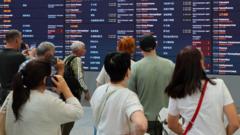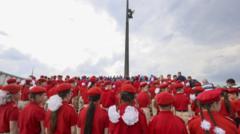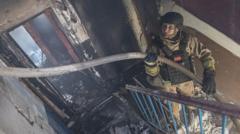Amid continued hostilities with Russia, Ukraine is intensifying its domestic arms production, seeking to bolster self-reliance while appealing for financial support from Western allies. The country’s reliance on foreign military aid has shifted from asking for weapons to soliciting funding to bolster local manufacturing capabilities. Ukrainian officials express the urgent need for increased investment to enhance production capacities, particularly as the war demands faster and more innovative responses.
Ukraine Advances in Domestic Arms Production Amid Ongoing Conflict

Ukraine Advances in Domestic Arms Production Amid Ongoing Conflict
As the war with Russia persists, Ukraine ramp up efforts to increase its self-sufficiency in arms production, facing challenges related to funding and firepower disparity with Russia.
The sounds of metal clanging and machinery whirring permeate the air at a factory in central Ukraine, where workers at Ukrainian Armor assemble armored personnel carriers and mortar launchers intended for frontline troops. This surge in domestic arms manufacturing signals a strategic shift for Ukraine as it confronts an ongoing war against Russia, a situation marked by increasingly unpredictable support from its allies.
Ukrainian Armor, a privately owned factory, reported doubling its vehicle output within the past year. However, its CEO, Vladislav Belbas, emphasized that this increase still falls short of the substantial needs of Ukrainian forces. The evolving military landscape has prompted Ukraine to revise its approach, now seeking funding to develop its own arms as continuous reliance on foreign aid appears insufficient, particularly in light of shifting U.S. military support.
Initially, Ukraine relied heavily on artillery and equipment donations from allies as its military campaign commenced in 2022. Presently, President Volodymyr Zelensky stated that around 40 percent of weapons engaged in combat are domestically produced, a figure they aim to dramatically increase. The Ukrainian defense industry's progress is most evident in its burgeoning drone production, which has become central to its military strategy.
Despite progress in arms production, financial constraints pose significant challenges. Experts, like Olena Bilousova from the Kyiv School of Economics, indicate that while Ukraine has capacity for $35 billion worth of military production annually, current outputs hover around $15 billion, signaling a critical funding gap. Last year, an agreement among allied nations facilitated over $500 million for Ukrainian manufacturing, but experts warn that more investment is essential to improve production capabilities against Russia's far larger military budget.
With Russian forces expanding their military capabilities, and producing munitions at a staggering rate, Ukraine faces the dual challenge of resource scarcity and technological advancement. Innovations such as vehicles designed for agility against drones reflect Ukraine's adaptive strategies on the battlefield, but core production areas, particularly mortars, remain the primary focus.
The production of critical artillery systems has transformed, with Ukraine reportedly achieving self-sufficiency in mortar production. However, the ambition for more advanced weapon systems encounters financial limitations, prompting Ukraine to explore partnerships with allies for establishing production facilities on safer foreign soil as a means of circumventing Russian attacks.
Denmark's recent endorsement of this initiative highlights the global implications of Ukraine's defense industrial push, as the nation leverages its unique expertise to assist European allies in enhancing their military readiness. President Zelensky is advocating for sustained investment in Ukraine's defense sector, asserting the interconnectedness of Ukraine’s security and that of Europe.
As the conflict grinds on, Ukraine's endeavor for military self-sufficiency underscores both the urgent need for financial backing and the importance of a robust domestic defense industry as a cornerstone of national security.





















